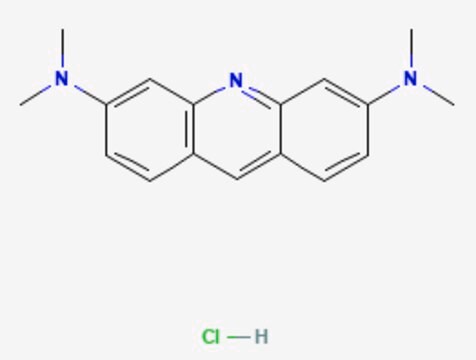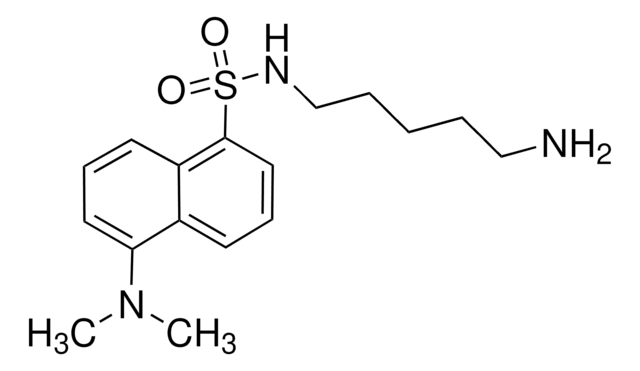318337
Acridine Orange hydrochloride hydrate
≥98% (HPLC)
Synonym(s):
3,6-Bis(dimethylamino)acridine hydrochloride
About This Item
Recommended Products
Quality Level
Assay
≥98% (HPLC)
form
powder
technique(s)
microbe id | staining: suitable
color
orange
mp
284-287 °C (lit.)
solubility
H2O: 0.1%, clear, orange to red
λmax
492 nm
ε (extinction coefficient)
≥14,000 at 227-233 nm in water at 0.005 g/L
≥35000 at 265-271 nm in water at 0.005 g/L
application(s)
diagnostic assay manufacturing
hematology
histology
storage temp.
room temp
SMILES string
Cl[H].[H]O[H].CN(C)c1ccc2cc3ccc(cc3nc2c1)N(C)C
InChI
1S/C17H19N3.ClH.H2O/c1-19(2)14-7-5-12-9-13-6-8-15(20(3)4)11-17(13)18-16(12)10-14;;/h5-11H,1-4H3;1H;1H2
InChI key
JUAAUEXLEKAEQC-UHFFFAOYSA-N
Looking for similar products? Visit Product Comparison Guide
Application
- to stain intracellular acidic vesicles.
- to measure lysosomal membrane permeability (LMP).
- or autophagy detection.
Biochem/physiol Actions
Signal Word
Warning
Hazard Statements
Precautionary Statements
Hazard Classifications
Muta. 2
Storage Class Code
11 - Combustible Solids
WGK
WGK 3
Flash Point(F)
Not applicable
Flash Point(C)
Not applicable
Personal Protective Equipment
Choose from one of the most recent versions:
Already Own This Product?
Find documentation for the products that you have recently purchased in the Document Library.
Customers Also Viewed
Our team of scientists has experience in all areas of research including Life Science, Material Science, Chemical Synthesis, Chromatography, Analytical and many others.
Contact Technical Service









